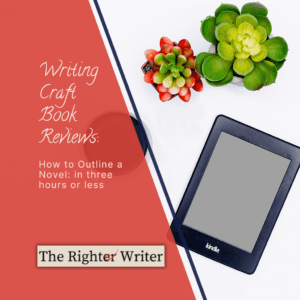
Writing Craft Book Reviews: A Book A Week
Fourth and last (for now!) in our series of book reviews featuring Kindle Unlimited books that explain ways to outline a novel. Let’s get ready for NaNoWriMo!
I'm an affiliate.
Some of the links on this page are affiliate links, but the opinions in my posts are my own, and I only mention products that I like and use myself. As an Amazon Associate, I earn from qualifying purchases. What that means is that if you click one of the links on my site and make a purchase, I might recieve compensation at no extra cost to you.

I hear the proofreader vs. editor question a lot, but it shouldn’t be an either/or thing. Proofreaders and editors do two completely different things and both of them play a part in making your work the best it can possibly be.
Once you have finished your piece of writing, whether it’s a novel, a financial report, or a master’s thesis, the first thing that you need to do is pat yourself on the back, because that was a lot of work!
Seriously! You have put a lot of work into this. And by this time, you have read it over so many times that you could probably say it line by line with your eyes closed. But because you’ve spent so much time on it, it’s going to be difficult to take a step back and see it afresh from an outsider’s perspective.
The first thing that you and your editor will look at is structure, where you make sure that your whole document is clear to your specific audience. An editor helps clarify the overall structure of your work. For instance, if you are writing a financial report, does each section—Introduction, Background, Purpose, Research, and Recommendation—contain the appropriate information? In your novel, does your main character have a solid character arc? Is your thesis in proper MLA style?

You may make several passes through the document with your editor, honing one aspect of the writing during each pass. By the end of the process, the editor will know your work almost as well as you do. And that means they may miss some small details because they are now so close to the work.
Proofreading happens after you are finished editing, and you know you’re not going to change anything else. This is when you look through the document for purely mechanical errors, like capitalization, punctuation, spelling, homophones, and grammar mistakes. It can also catch language issues. When you have used too much passive voice it can sound boring, and too many adverbs can sound unprofessional. A good proofreader will point these out.
Proofreading is the very last thing that happens before you send your document out into the world to be judged by strangers. And it’s most effective when it’s done by a stranger. Someone who is reading your manuscript, paper, or thesis for the very first time will catch mistakes that both you and your editor have missed. Familiarity with the manuscript can make simple mistakes like typos blend into the background.

Well, in the best-case scenario you would finish your project and then spend some time working with an editor. You would polish the language and style so that it was the best that it could be. Then you would send it away to a proofreader. They would put a final gloss on it before you published it and sent it out into the world.
But you and I both know but the best case scenario rarely happens.
Sometimes there just isn’t enough time or money to work with professionals for both jobs. If you’re trying to decide, proofreader vs. editor, think about your own skills. Find someone to help with whichever area is your weakest. If you are a strong writer but can’t remember if it’s there, they’re, or their, then self-edit and hire a good proofreader. On the other hand, if you are sure your spelling is fine but are less confident in the presentation of your ideas, then invest in a professional editor, and trust your autocorrect.
If you are still questioning: proofreader vs. editor? then you can always contact me about a beta reading. You will get the answers to your questions and a clear idea of what the next step is for your manuscript. You can send me information about your project and your questions here on my contact page.
And if you want more information about the different types of editing, Reedsy has a great blog post here.

Fourth and last (for now!) in our series of book reviews featuring Kindle Unlimited books that explain ways to outline a novel. Let’s get ready for NaNoWriMo!

Third in our series of book reviews featuring Kindle Unlimited books that explain ways to outline a novel. Let’s get ready for NaNoWriMo!

Second in our series of book reviews featuring Kindle Unlimited books that explain ways to outline a novel. Let’s get ready for NaNoWriMo!

I help authors, researchers, business people, students, and web marketers to polish their writing before they send it out into the world.
